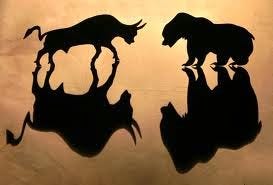The Stock Markets—a Reality Show

A reality show is a genre of television programming that documents unscripted situations and actual occurrences, often featuring a previously publicly unknown cast. This is an equally elegant description of the investor-class.
Various stock markets claim the arguable reality of honestly evaluating various listed shares by their members’ willingness to buy and sell. But there the buck stops. It ain’t the game it used to be.
Once upon a time in a market far, far away there lived a weathered and bespectacled investor who put his capital (or the money entrusted to him by others) into well-researched companies. He knew these firms as well as they could be known, by their history, credit-worthiness, integrity, steadiness of purpose and longevity. He and his clients were in for the long-haul, he lived in a quiet but prosperous part of town and drove a late-model Buick. Had he done well over a long period of time, he might own a well-polished Cadillac of recent vintage and tipped his hat to the ladies.
He is no more, this grand old soul—extinct as the dodo and Old Mother Hubbard, lost to the vagaries of time.
Today, investors have been all but shoved aside by traders, with no more allegiance to the firms in which they ‘invest’ than steely-eyed speculation upon their rise and fall.
How else could the idea of a company like Facebook come out of the gate with an IPO that values it at five or six times the worth of a company like General Motors? How else could ‘investors’ appear who deal in the sliver-margins and pennies to be made in high-frequency trading, where algorithms determine the buy or sell and programmers replace research? How else could firms blossom like Bain Capital, buying shaky companies, stripping them of assets, goosing their stock price, loading them with debt to walk off with the cash?
Which would all be of merely academic interest and complaint, were it not for the fallout:
Weak companies no longer go bankrupt to clear the land for better innovators. They often are merged with profitable firms for the tax benefit (which is really more a tax than investor problem) and continue cluttering the scene as zombie firms, spewing deductible loss. The weakness is that large loss carry-forwards attract investor interest to the parent and mask accurate corporate valuation.
Corporations are so tied to Quarterly Earnings to support their stock price that CEOs concentrate on the next quarterly report, with little time to attend the longer term health of the company. Several years ago, Google earned record profits and their shares actually fell in value because they failed to hit projected investor targets.
CEOs (and others with company stock options) project as well. Hugely rewarded by the short-term rise in stock price, the major portion of their earnings may reside in options, so their focus is there rather than long range planning. Goose the stock becomes a mantra, then move on to goose the stock elsewhere, then move on. The wreckage is often found floating in the wake, as it was when Jack Welch retired from GE.
Small investors are removed from the market, to fly blind or invest in a fund or trust, an unhealthy trend that further separates the middle-class and rich as hedge-funds and institutional investors dominate. Because of these troubling circumstances, the markets are volatile as never before. How can the DOW (which topped 14,000 just prior to the 2008 crash) possibly now be above 17,000 (and rising) while America remains in such structural economic distress?
Market speculation continues to breed a whole tribe of corporate raiders such as Carl Icahn, Dan Loeb, Ralph Whitworth and David Einhorn. These men bring absolutely no value to the table. They invent nothing, produce nothing, develop nothing and sell nothing, bringing only chaos and fear to corporate decision-making. Their sole purpose is to either extort by proxy fight or temporarily pump earnings by any means to profit in the short term.
That’s a ton of fallout at a time when economies world-wide are in danger of collapse and our own leads the way.
We talk and talk, wring our hands and speculate about the collapse of the environment from coal-burning pollution. Yet our economy has its own remarkably fragile environment and speculation is its pollutant. The financial skies are darkening.
We might do well to remember that glaciers melt and seas rise in market-driven environments as well.
